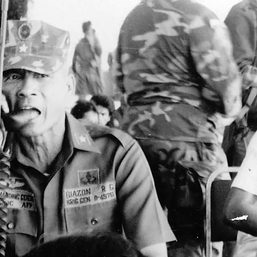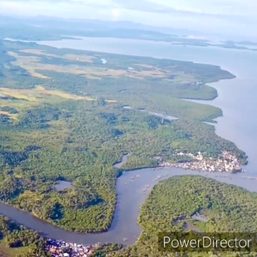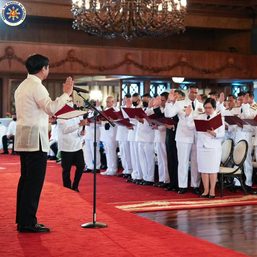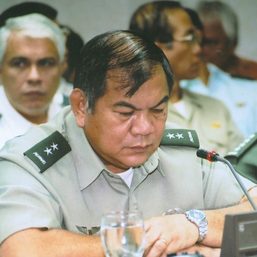SUMMARY
This is AI generated summarization, which may have errors. For context, always refer to the full article.
![[OPINION | Newspoint] Poster boy of militarization](https://www.rappler.com/tachyon/2020/10/poster-boy-militarization-october-31-2020.jpg)
Lieutenant General Antonio Parlade is emerging as the poster boy of President Duterte’s militarized regime. He has taken up his position at the right end of the ideological corridor so that he could only see left.
Invariably, whoever appears on that side is to him not just a leftist, being which there’s nothing wrong, but a subversive, and that impels him to raise the alarm, which he posts on his Facebook account. But, inciting by their nature, his posts get re-aired in other media platforms as a point of reference in the ensuing public discourse.
Parlade makes it look as though he’s doing it beyond the call of duty, as though he’s acting out of a sense of public emergency. But how can anyone be fooled when he appears only too pleased with his newly acquired high profile?
Indeed, his choices of target tend to betray an aspiration of his own to celebrity. A not too subtle case involves the actors Catriona Gray (Miss Universe 2018), Liza Soberano, and Angel Locsin. By supporting campaigns for freedoms and rights, the 3 have incurred warnings from Parlade, who in turn, by riding their coattails, has earned for himself his own moment in the spotlight.
But, despite the self-indulgent overtones of his overreach, it’s hard to believe that Parlade is acting entirely on his own – after all, no institution is more severely hierarchical than the military, which is well-understood.
Sought out by the media, Defense Secretary Delfin Lorenzana said Parlade should not be making rash accusations. But all too soon after stepping up, looking serious and fair-minded and in command, and, as he had promised, talking to Parlade to call him out in person, Lorenzana came out with his credibility decidedly damaged. He said that Parlade, after all, “will still be doing what he is doing, but would be more careful in accusing people if there is no evidence.” Lorenzana could not have missed the point ignorantly.
Regardless of whether or not he has evidence, Parlade has no business accusing anyone of any crime in public. It is simply not his place. His place, as is any other soldier’s, is either the barracks or the battleground. In fact, he should not only keep his opinions to himself but stay out of sight, because, as armed state power personified, when he goes public, particularly on issues of rights and freedoms, entitlements that he tends to view as something abused, rather than enjoyed, he is bound to cause unease, at least.
In any case, it’s easy to imagine Parlade persisting and prevailing and Lorenzana retreating. The way he doubles down on his dubious convictions, Parlade would seem a better fit than the tentative Lorenzana in Duterte’s errant presidency, in which the military dominates and traditions and norms and, indeed, the rule of law itself have been upended.
Parlade is chilling news enough as it is. But situating him in the context of the Anti-Terrorism Act, one can just imagine what further horrible things he can make of himself – legally!
The law has met with a host of constitutional challenges for flagrant flaws. For instance, it gives an Anti-Terrorism Council composed of presidential appointees the power – one that normally, exclusively rests with the courts – to issue a warrant of arrest; the warrant can even wait after the arrest. It also increases the time a suspect may be detained without charges to more than 3 weeks, from 36 hours, for all capital-crime suspects. But the law’s most fundamental and most ridiculous flaw is that it punishes a crime it does not even define but only describes so broadly the Anti-Terrorism Council and its enforcers can make of the law and do anything by it as they please.
For all that, the Supreme Court has not granted pleas that, while it is deciding the protests, the law should be suspended.
In the meantime, the Department of Justice has come up with the Implementing Rules and Regulations for it. And so, we now have the law, the process by which it shall be applied, and the schedule of penalties. What we don’t have is the crime? If that situation does not frighten you enough, try putting Parlade in it. – Rappler.com
Add a comment
How does this make you feel?


![[OPINION] Is Marcos in full command of defense, military establishments?](https://www.rappler.com/tachyon/2023/02/tl-marcos-centino-incognito.jpg?resize=257%2C257&crop_strategy=attention)


There are no comments yet. Add your comment to start the conversation.